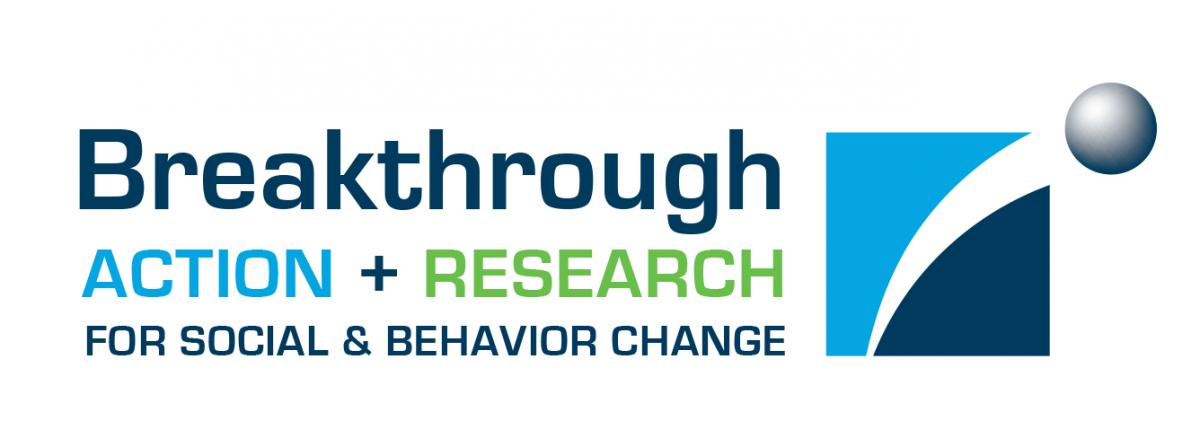
From 2015 to 2019, USAID and implementing partners worked to control the spread of Zika and to promote Zika prevention behaviors in Latin America and the Caribbean. As part of this response, Breakthrough ACTION and Breakthrough RESEARCH implemented social and behavior change (SBC) efforts across the region. This Trending Topic page includes the practical tools, research findings, and resources created by Breakthrough ACTION + RESEARCH throughout the USAID Zika response. It also includes key SBC lessons learned, success stories, and a call to action to implement SBC in outbreak responses. These resources can be used to inform current and future SBC programming for Zika and similar epidemics, particularly of diseases such as dengue that are transmitted by the same mosquito.
A cornerstone activity of the Zika response was prioritizing evidence-based Zika prevention behaviors. At the outset of the response, more than 30 prevention behaviors were being promoted. Message harmonization was essential to ensure communities received consistent, specific, and actionable information for Zika prevention. The resulting resources—including the Zika Prevention Behavior Matrix, Technical Specifications Content Guide, and an interactive online platform—outlined seven evidence-based behaviors with the greatest potential to prevent Zika, and provided implementing partners with the knowledge, tools, and resources to promote them.
Breakthrough ACTION also provided critical capacity strengthening support to implementing partners and governments throughout the Zika response. Under this effort, Breakthrough ACTION created job aids to assist community health promoters in better communicating the key prevention behaviors during home visits, as well as a Facilitator’s Guide for Training on Interpersonal Communication Skills. Breakthrough ACTION + RESEARCH also ensured that SBC programming was evidence-based by conducting and socializing research that explored the various behavioral determinants of Zika prevention.
Resulting research reports include analyses of knowledge, attitudes, and practices related to Zika, along with perceptions of feasibility and effectiveness of specific prevention behaviors. An additional report explores environmental, structural, and behavioral challenges related to water storage.
In an effort to support and strengthen future outbreak responses, Breakthrough ACTION + RESEARCH documented lessons learned and success stories from their experiences. These documents include overall lessons learned regarding SBC in the Zika response, as well as lessons specific to SBC working groups, capacity strengthening activities, and the use of human-centered design approaches.
The above-mentioned documents are listed below.
This list includes:
Behavior Prioritization | |
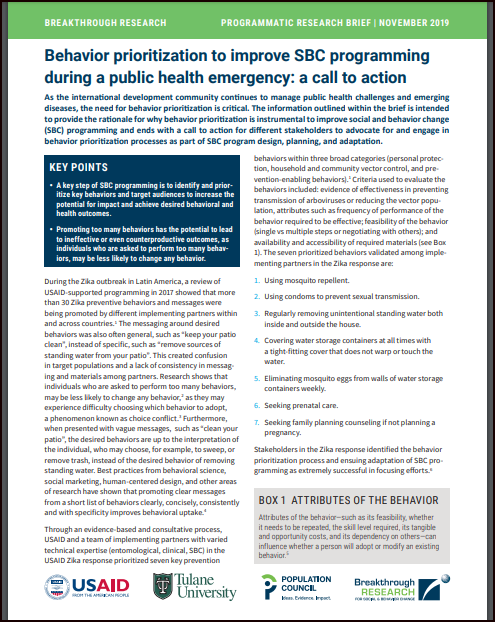 | Behavior Prioritization to Improve SBC Programming During a Public Health Emergency: A Call To ActionThis call-to-action brief (available in English and Spanish) focuses on the rationale for and benefits of behavior prioritization in the context of the Zika outbreak and response. Global and national-level decisionmakers, along with SBC and public health program implementers, can use this document to advocate for behavior prioritization as a necessary step in SBC design, implementation, monitoring, and evaluation. |
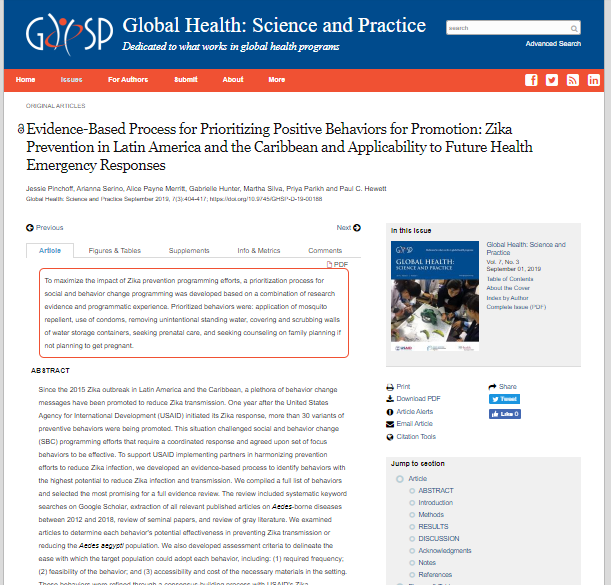 | Evidence-Based Prioritization Process to Identify Behaviors for Zika PreventionThis peer-reviewed publication documents the evidence-based behavior prioritization process during the 2015 Zika outbreak in Latin America and the Caribbean. Program implementers can use this document to inform future social and behavior change (SBC) programming during public health emergencies, especially when limited evidence is available. |
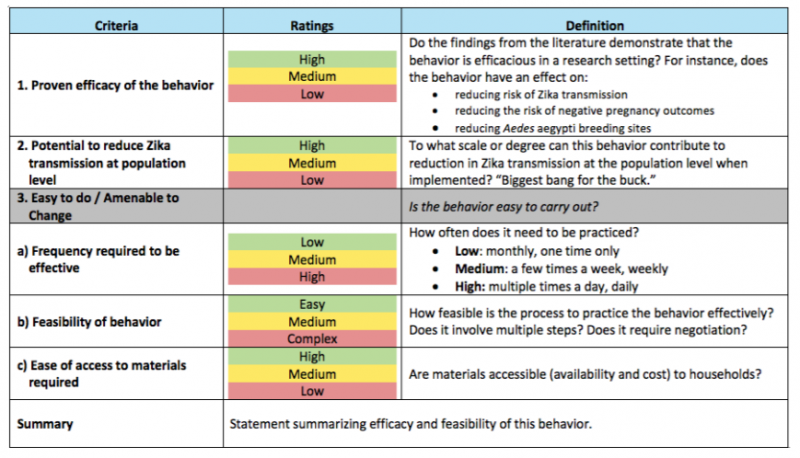 | Zika Prevention Behavior MatrixThe Zika Prevention Behavior Matrix (available in English and Spanish) focuses on the key behaviors that have the greatest potential to reduce Zika transmission and minimize negative pregnancy outcomes. Partners addressing Zika can use this reference document to promote a harmonized set of behaviors, to “speak with one voice,” and increase the chances that effective behaviors are adopted correctly. |
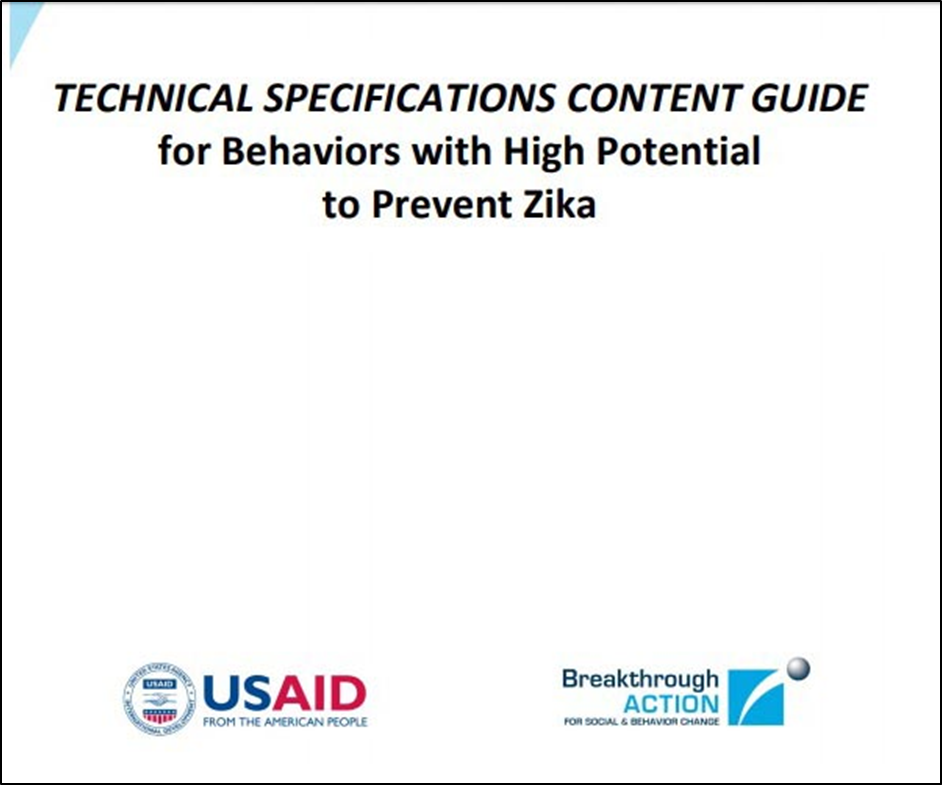 | Technical Specifications Content Guide for Behaviors with High Potential to Prevent ZikaThe Technical Specifications Content Guide (available in English and Spanish) specifies the evidence-based technical requirements and steps to be followed for the practice of each key behavior to reduce the risk of negative consequences caused by Zika during pregnancy. This reference document for partners in the Zika response provides detailed technical information and specific steps to facilitate the adoption of the desired behavior. |
Practical Tools | |
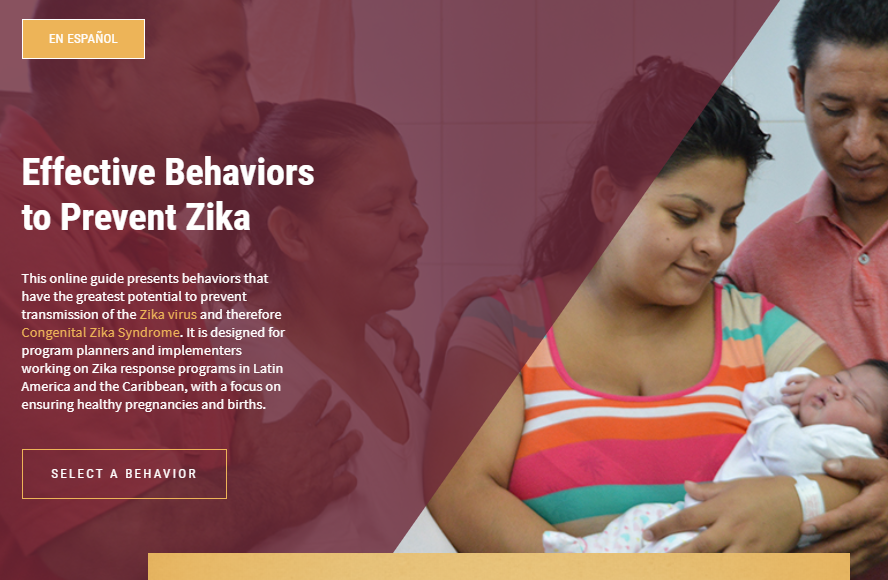 | Effective Behaviors to Prevent ZikaThis interactive online guide (available in English and Spanish) presents seven behaviors with the greatest potential to prevent the transmission of the Zika virus and in turn Congenital Zika Syndrome. Designed for program planners and implementers, the guide includes a short overview video as well as key facts, behavior promotion tips, background evidence, and downloadable PDFs for each behavior. |
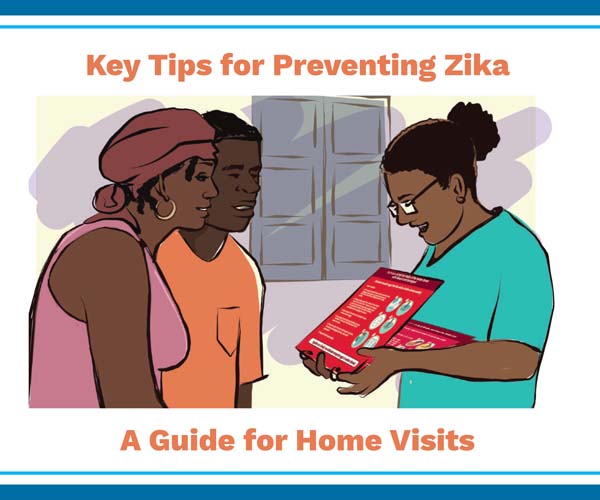 | Key Tips for the Prevention of Zika, Dengue and Chikungunya: A Guide for Home VisitsThis tool (available in English and Spanish) is for community volunteers and health promoters to facilitate home visits in support of the promotion of key behaviors for Zika, dengue, and chikungunya prevention. Organizations, institutions, and projects can adapt the tool to the needs of their organization and country, and Breakthrough ACTION has developed an accompanying guide (in Spanish) that recommends how to adapt the tool to specific needs. |
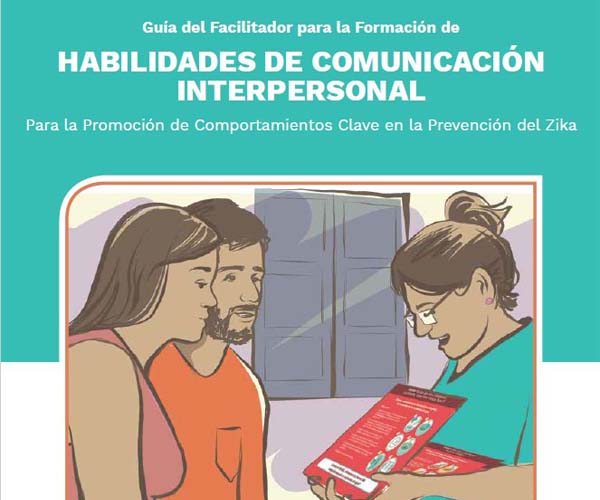 | Facilitator’s Guide for Training on Interpersonal Communication SkillsThis guide (available in English and Spanish) is for facilitators who will lead trainings in “Interpersonal Communication Skills for the Promotion of Key Behaviors for Zika Prevention.” The guide provides step-by-step instructions on how to implement the training to their field teams. |
Research Reports | |
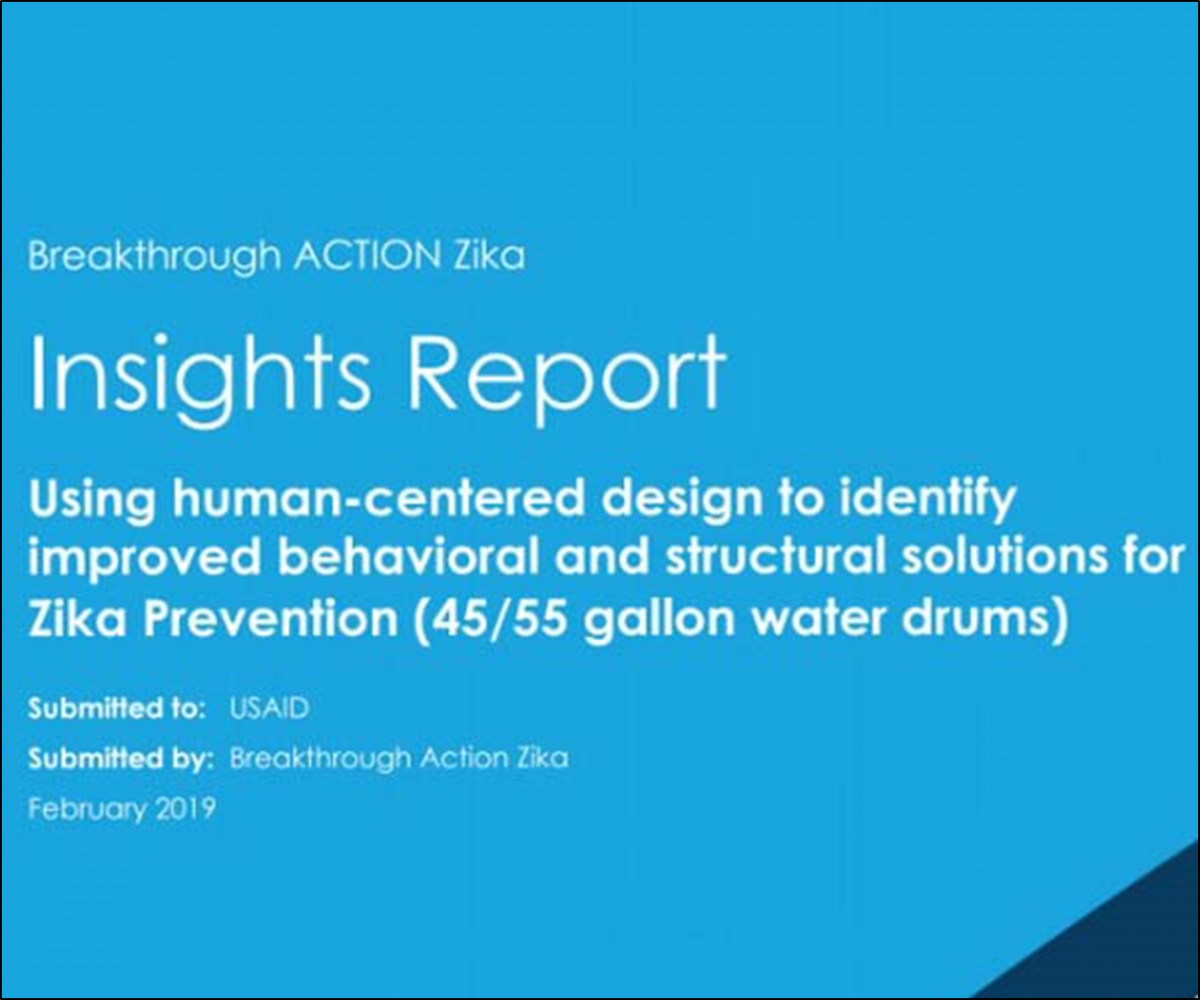 | Insights Report: Using Human-Centered Design to Identify Improved Behavioral and Structural Solutions for Zika PreventionThis report outlines the exploratory research that sought to understand environmental, structural, and behavioral challenges in Jamaica related to water storage. The report’s findings informed social and behavior change (SBC) implementers and their programs around addressing uncovered or poorly covered water drums, resulting in Aedes aegypti breeding sites. |
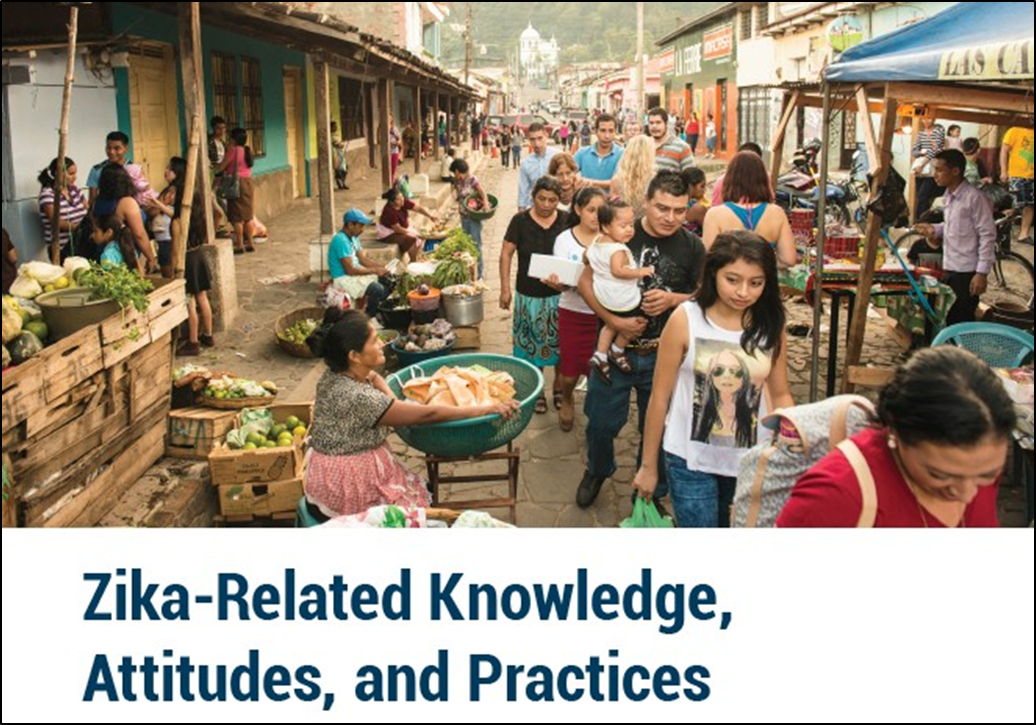 | Programmatic Implications of Zika-Related Knowledge, Attitudes, and PracticesThis suite of Zika-Related Knowledge, Attitudes, and Practices programmatic research briefs (available in English and Spanish) assesses various social and behavioral determinants related to Zika prevention in the Dominican Republic, El Salvador, Guatemala, and Honduras. The surveys provided key insights for implementers that supported an evidence-based approach for social and behavior change (SBC) programming directed toward increasing Zika prevention behaviors at the household and community level, particularly those behaviors with the greatest potential to reduce Zika transmission and minimize negative pregnancy outcomes. |
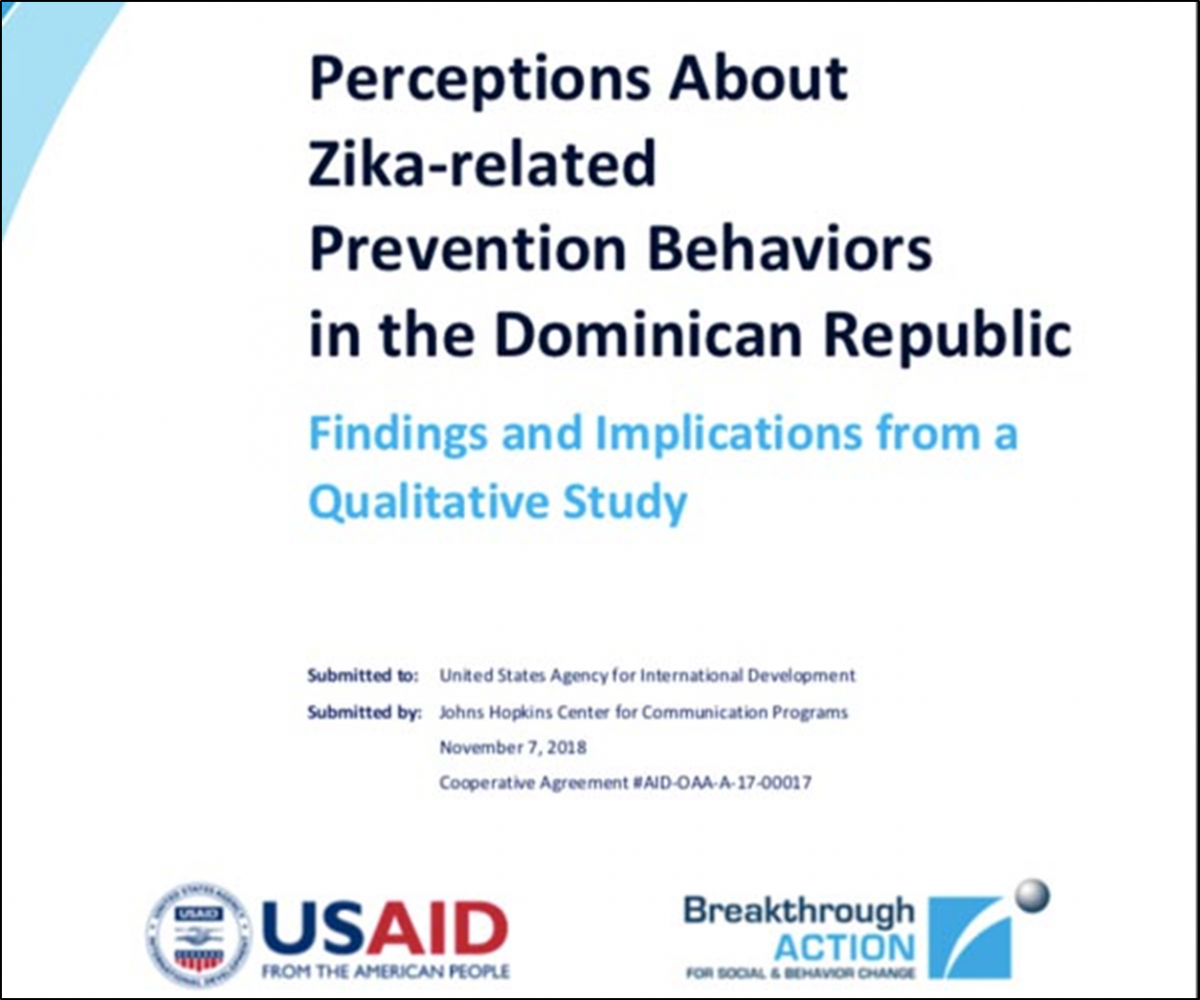 | Perceptions about Zika-related Prevention Behaviors in the Dominican Republic: Findings and Implications from a Qualitative StudyThis qualitative research report (available in English and Spanish) details the findings of formative research that sought to understand the perceptions of the effectiveness and feasibility of Zika prevention actions in the Dominican Republic. The report also provides recommendations for implementers of future Zika and other mosquito-borne prevention programming. |
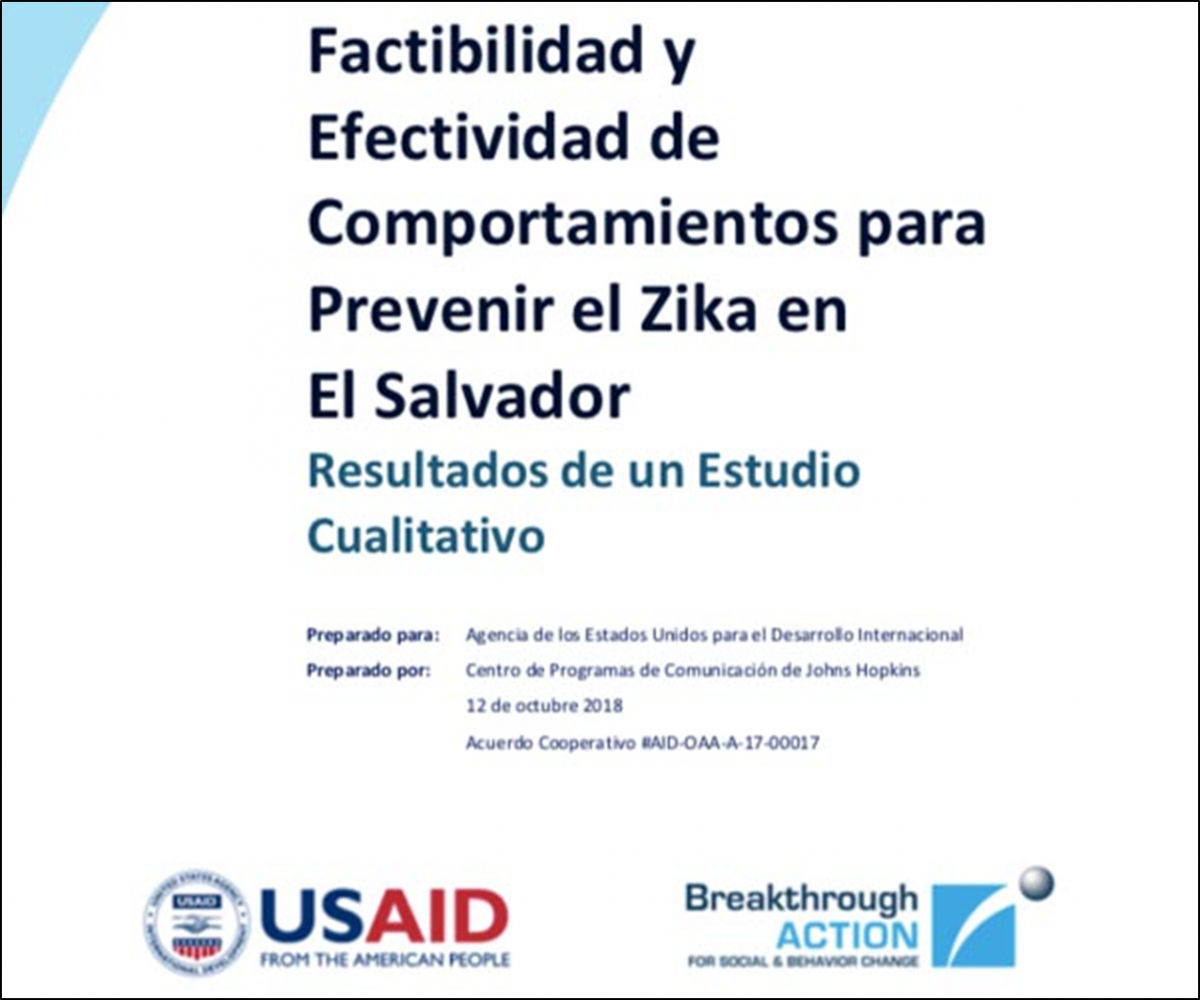 | Feasibility and Effectiveness of Behaviors to Prevent Zika in El Salvador: Results of a Qualitative StudyThis qualitative research report (available in English and Spanish) details the findings of formative research that sought to understand the perceptions of the effectiveness and feasibility of Zika prevention actions in El Salvador. The report also provides recommendations for implementers of future Zika and other mosquito-borne prevention programming. |
Lessons Learned – Success Stories | |
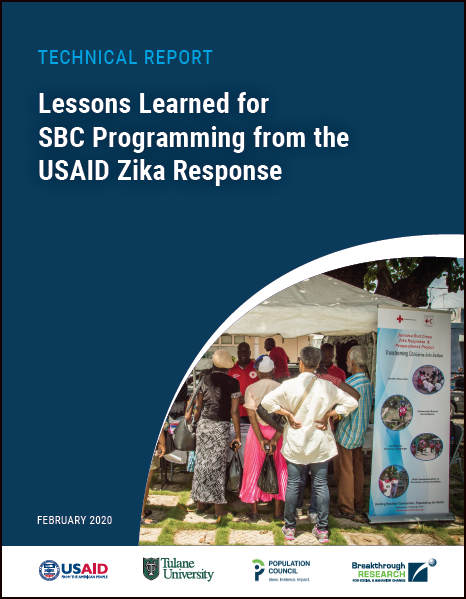 | Lessons Learned for SBC Programming from the USAID Zika Response (Technical Report)This technical report outlines Breakthrough RESEARCH’s efforts to document lessons learned in social and behavior change (SBC) programming from the USAID Zika response. This document focuses on SBC strategic design, planning, implementation, and evidence generation efforts within the USAID Zika response, which can inform USAID and other key bilateral and multilateral stakeholders on how to apply lessons learned to future Aedes aegypti-borne disease outbreaks and other public health emergency responses. |
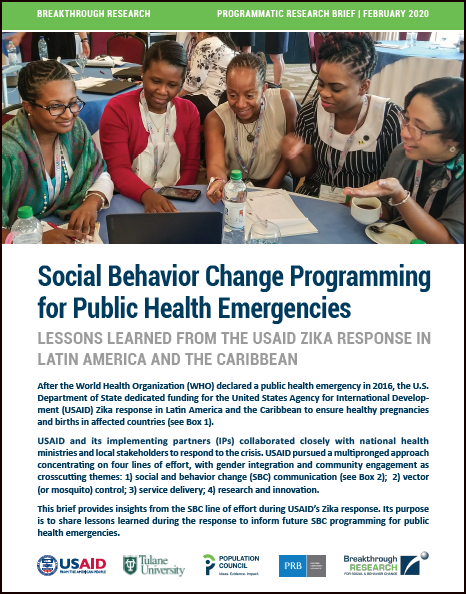 | Social Behavior Change Programming for Public Health Emergencies: Lessons Learned from the USAID Zika Response in Latin America and the Caribbean (Programmatic Brief)This brief provides insights from the social and behavior change (SBC) line of effort during the 2016-2019 Zika response when USAID and its implementing partners collaborated closely with national health ministries and local stakeholders in Latin America and the Caribbean. It describes strengths, weaknesses, gaps, and challenges, and highlights seven key recommendations that future public health emergency responses should incorporate to safeguard the health and well-being of people around the world. |
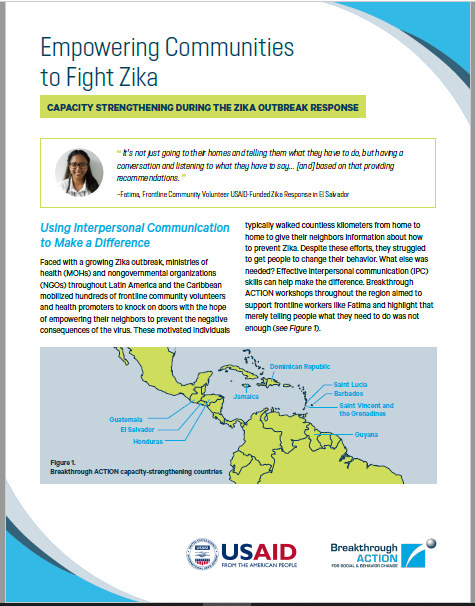 | Capacity Strengthening During the Zika Outbreak Response: Empowering Communities to Fight ZikaThis success story outlines the role of Breakthrough ACTION’s capacity-strengthening activities as well as the importance of enhancing interpersonal communication skills of frontline workers to improve household uptake of Zika prevention behaviors. Household visits by frontline community workers were a cornerstone activity in the USAID-funded Zika response, which provided a unique communication opportunity between families and community workers. |
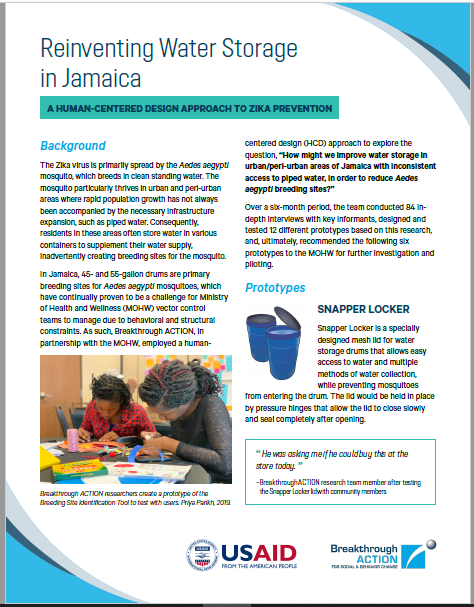 | Reinventing Water Storage in Jamaica: A Human-Centered Design Approach to Zika PreventionThis success story highlights Breakthrough ACTION’S experiences implementing a human-centered design (HCD) approach to identify improved behavioral and structural solutions for Zika prevention. The document includes information regarding the HCD process, final prototypes, and the importance of a community-driven social and behavior change (SBC) programs, which can inform USAID and SBC partners in future public health emergencies. |
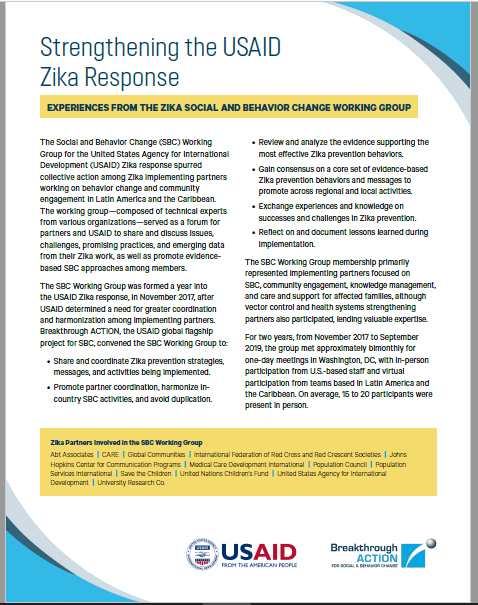 | Strengthening the USAID Zika Response: Experiences from the Zika Social and Behavior Change Working GroupThis success story outlines the role of the Social and Behavior Change (SBC) Working Group for the USAID Response. The working group—made up of technical experts representing various implementing partners from the USAID Zika response—served as a forum for partners and USAID to share and discuss issues, challenges, solutions, and best practices for Zika prevention and promote emerging and evidence-based practices. This document highlights how the group was initiated, key successes, and lessons learned for USAID and partners in future outbreak responses. |
Banner photo: Zika implementing partners participate in a share fair to discuss community engagement in the USAID Zika response. © 2018, K4Health






